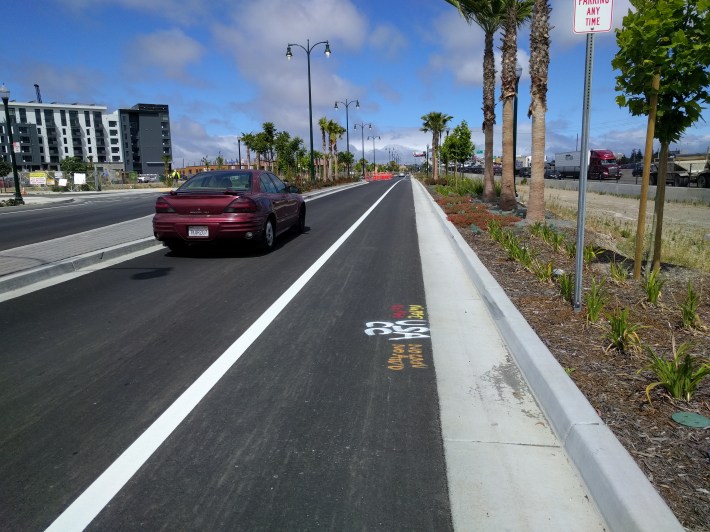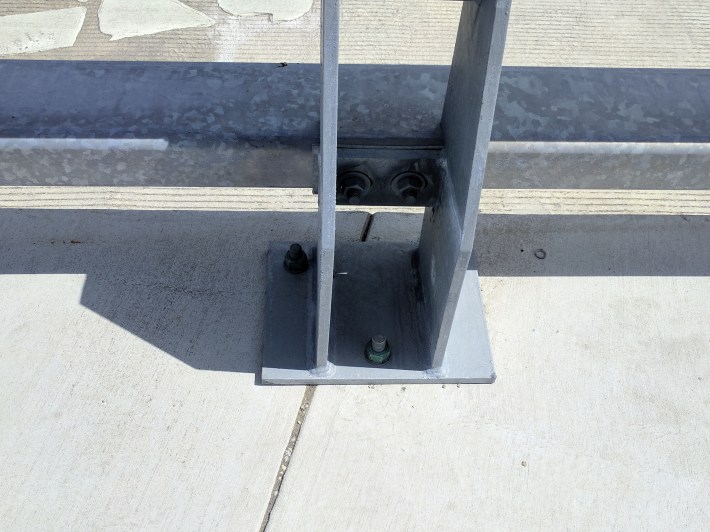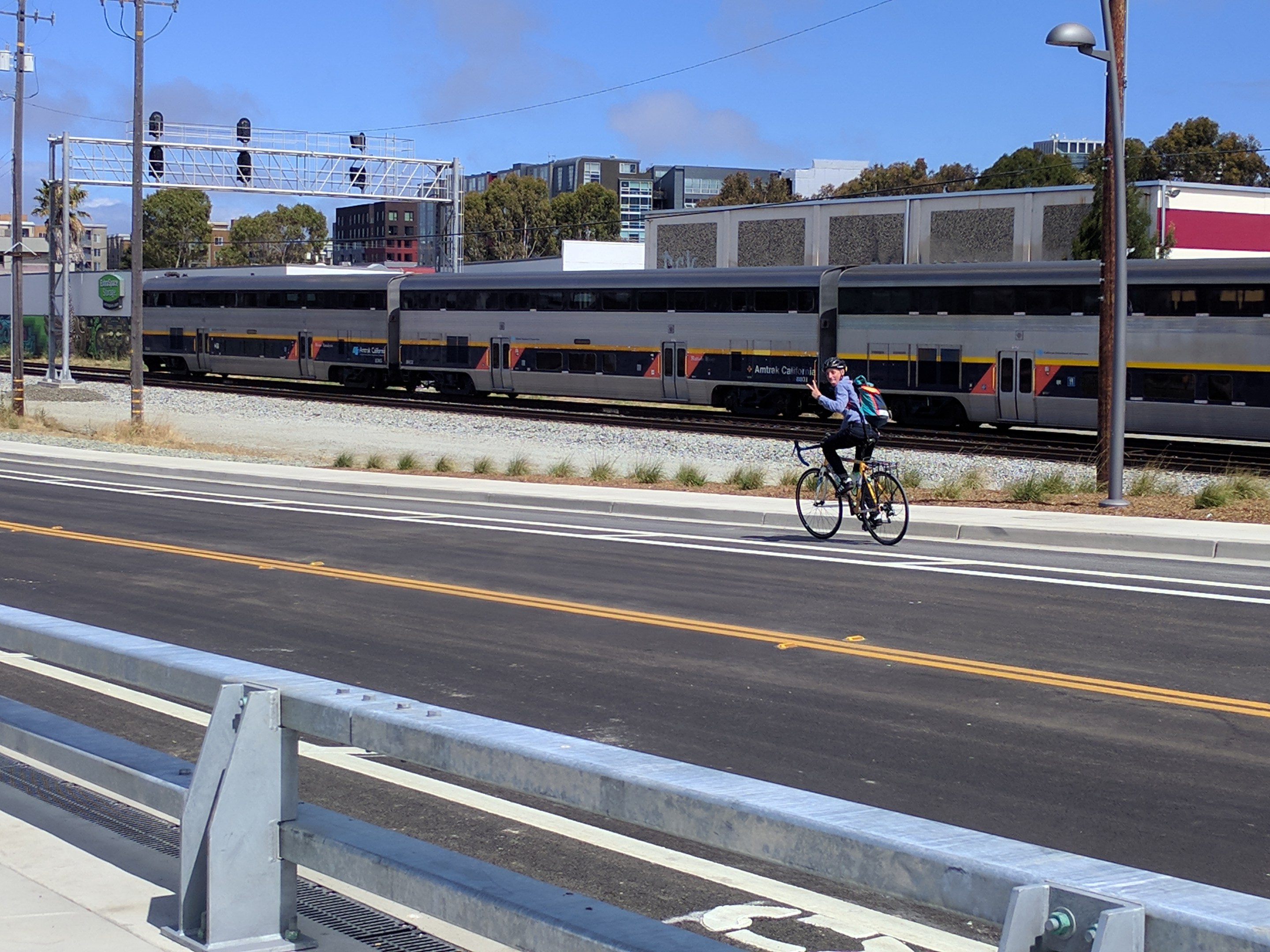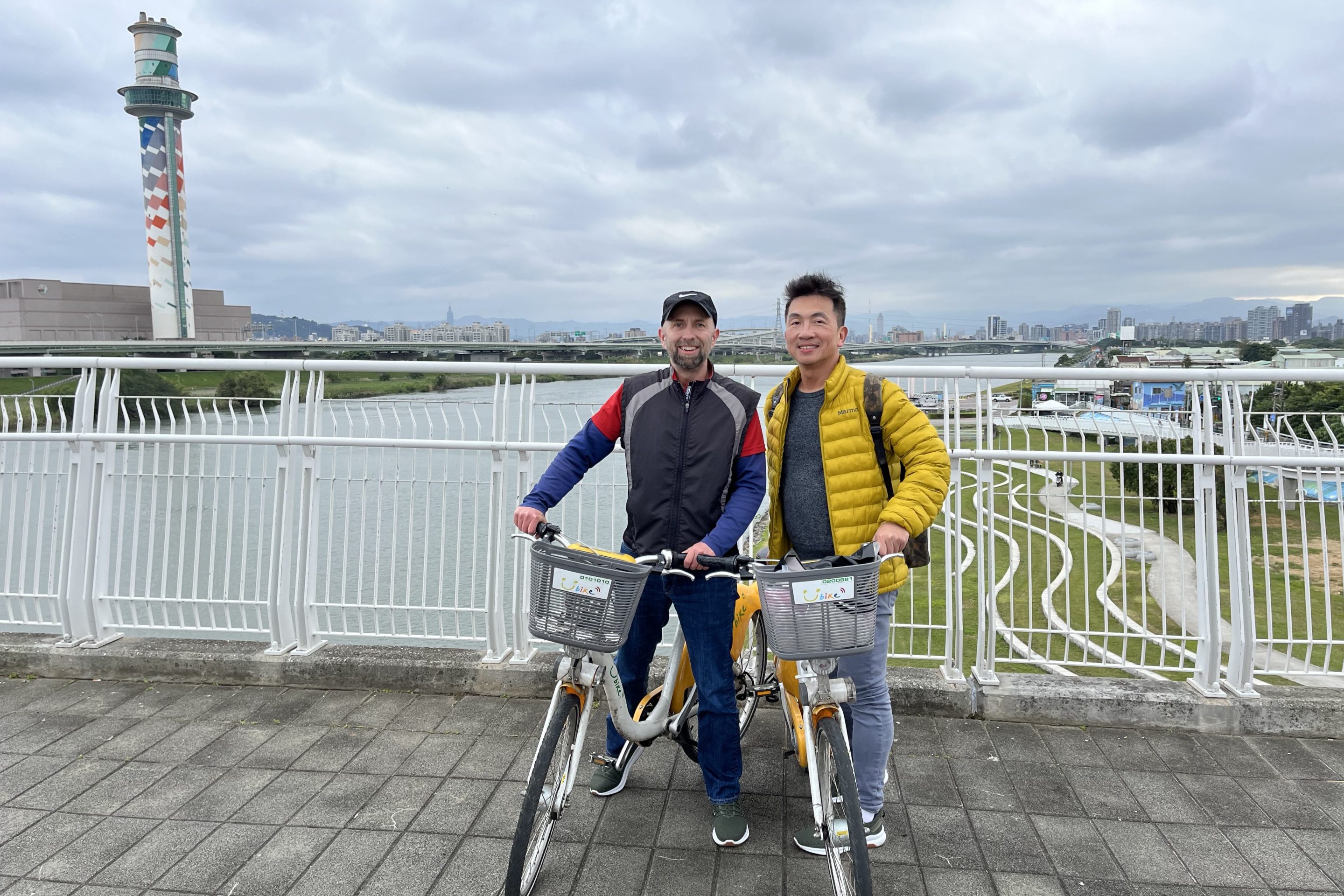Note: GJEL Accident Attorneys regularly sponsors coverage on Streetsblog San Francisco and Streetsblog California. Unless noted in the story, GJEL Accident Attorneys is not consulted for the content or editorial direction of the sponsored content.
The official ribbon cutting isn't until Friday, but Streetsblog took a ride this morning across Oakland's newly completed Embarcadero channel bridge connecting Brooklyn Basin with Jack London Square along the waterfront. The project was part of a seismic replacement for an older, narrower bridge that used to cross the channel at the same location.
From Oakland's web page on the $23 million project:
The new bridge will be wider (59 feet versus the current 37 feet). In addition to 12-foot vehicle travel lanes in each direction, it will accommodate a 6-foot bike lane in each direction, a 5-foot wide sidewalk on the north side, and a 12-foot wide multi-use path on the south (Estuary) side. The extra width will allow pedestrian and bicyclist access along the waterfront trail.
And there's the rub. As Streetsblog reported almost a year ago, it's nice to have bike lanes, but it's incredibly lame to have a city spend all this money on new infrastructure and once again put the crash barrier on the wrong side of the lane, as seen below:

So now cyclists don't just have to worry about getting hit by a motorist--they can get crushed against a crash barrier too.
This follows a pattern on other bridges, such as the one over the estuary channel on Lake Merritt Boulevard. Engineers install a hefty crash barrier to keep drunk or otherwise unsafe motorists from careening off the bridge and into the water (and, thankfully, from murdering pedestrians on the sidewalk). But it does nothing to protect bicyclists. It is hardly infrastructure that's safe for cyclists of all ages and mobility.
Arguably the most maddening part is it would have cost exactly the same amount of money to place the barrier in a way that protects cyclists too. So why was it built this way? Streetsblog has the question out to OakDOT and will update.
UPDATE: June 28. The reason is the "bike lane" doubles as a breakdown lane, so a stuck car can pull over into it and not hold up motor traffic. Try to wrap your head around that warping of priorities.
"These projects are in the pipeline for so long--that's part of the problem: by the time they get built designs are out of date," said Bike East Bay spokesperson Susie Hufstader. She added that she's glad the bridge is there again, as the detour to 8th Street was costing her an extra fifteen minutes on her morning bike commute (for the record, that's her in the lead image).
Meanwhile, as Streetsblog and Hufstader spoke on the sidewalk, safely behind the barrier, two cars passed at near-freeway speeds and swept right across the bike lane.
To be clear, there is good news about this project for vulnerable road users. For one, it does have nice sidewalks--and the waterside sidewalk is extra wide, as indicated on the project web page, so cyclists can share it with pedestrians (although that will be pretty awkward for westbound cyclists to use). And at the bridge's southern landing, Embarcadero now has a wide (and in parts buffered) bike lane thanks to the hard work of Bike East Bay's advocates (and, we'd like to think, an assist by grumpy ol' Streetsblog in pointing out some deficiencies last year). They aren't there yet, but word has it some combination of bollards and rubber curbs will be added to protect it.
"Thankfully, staff were able to take another look at the plans for Embarcadero (the street, not the bridge) between 5th and 10th Aves next to Brooklyn Basin, originally planned to have a buffered bike lane next to curbside parking, and upgraded it to include a protected bikeway with no curbside parking. Additional revisions can be implemented to include protected intersections," wrote Bike East Bay's Robert Prinz in an email to Streetsblog.

That's all great, but painted buffers and posts and rubber curbs are what is supposed to be installed to retrofit bad designs, of which there's no shortage. In this case, it's an all-new road built in an area with plenty of room for a completely separate bike facility that could be safe for children and adults alike to cycle on. Just look at the above image and imagine it with the trees and the bike lane flipped. Or they could have built a completely separate, two-way cycle track on the water side of the street, much as has now been done along parts of Lake Merritt.

We have to wonder what this scene is going to look like once the thousands of units of the Brooklyn Basin housing project are filled, and all those motorists stuck on I-880 figure out they can detour/Waze onto the new bridge and Embarcadero. Will motorists cheat and drive on the bike lane as traffic backs up (you can count on it)? Will Ubers and Lyfts pull around the posts and into the buffer to discharge passengers? Will a cyclist get creamed in the intersection mixing zones shown above, which wedge cyclists's vulnerable bodies between fast moving trucks and cars? We can only hope the additional improvements Prinz mentioned will go in quickly.
Either way, it's a frustrating shame about the misplaced barriers on the bridge. "This is also why it is so important for big capitol projects to be as visionary as possible, not just based on existing conditions, since they take so long to deliver and need to still be relevant for many years beyond that," wrote Prinz.

On the other hand, compared to Caltrans's new death bridges a couple of miles up the street, at 23rd and 29th, the Embarcadero bridge looks practically Dutch.






